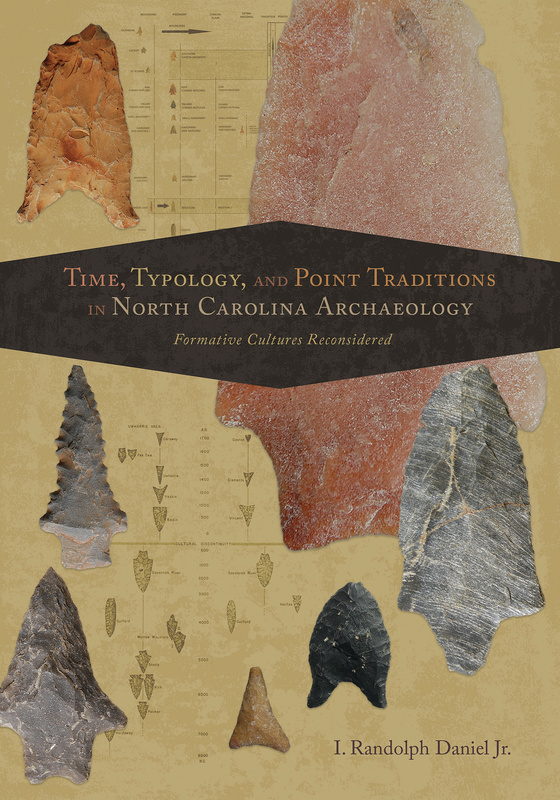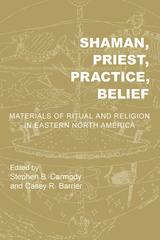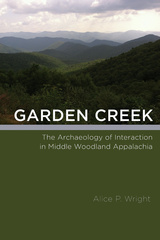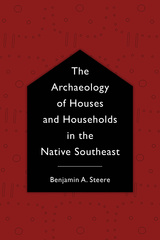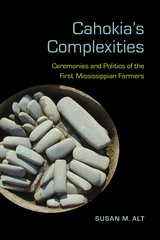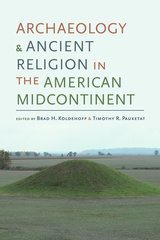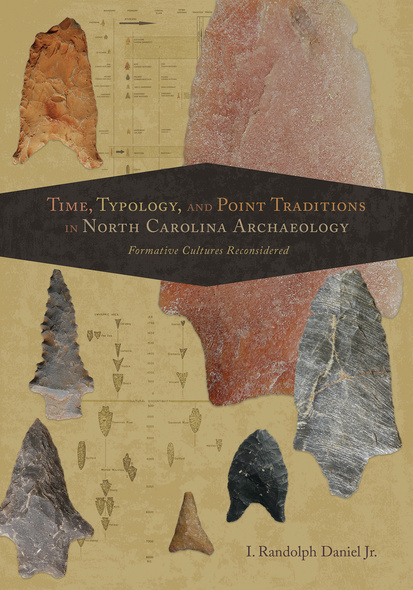
232 pages, 7 x 10
47 B&W figures - 2 maps - 2 tables
Hardcover
Release Date:02 Mar 2021
ISBN:9780817320867
Time, Typology, and Point Traditions in North Carolina Archaeology
Formative Cultures Reconsidered
University of Alabama Press
A reconsideration of the seminal projectile point typology
In the 1964 landmark publication The Formative Cultures of the Carolina Piedmont, Joffre Coe established a projectile point typology and chronology that, for the first time, allowed archaeologists to identify the relative age of a site or site deposit based on the point types recovered there. Consistent with the cultural-historical paradigm of the day, the “Coe axiom” stipulated that only one point type was produced at one moment in time in a particular location. Moreover, Coe identified periods of “cultural continuity” and “discontinuity” in the chronology based on perceived similarities and differences in point styles through time.
In Time, Typology, and Point Traditions in North Carolina Archaeology: Formative Cultures Reconsidered, I. Randolph Daniel Jr. reevaluates the Coe typology and sequence, analyzing their strengths and weaknesses. Daniel reviews the history of the projectile point type concept in the Southeast and revisits both Coe’s axiom and his notions regarding cultural continuity and change based on point types. In addition, Daniel updates Coe’s typology by clarifying or revising existing types and including types unrecognized in Coe’s monograph. Daniel also adopts a practice-centered approach to interpreting types and organizes them into several technological traditions that trace ancestral-descendent communities of practice that relate to our current understanding of North Carolina prehistory.
Appealing to professional and avocational archaeologists, Daniel provides ample illustrations of points in the book as well as color versions on a dedicated website. Daniel dedicates a final chapter to a discussion of the ethical issues related to professional archaeologists using private artifact collections. He calls for greater collaboration between professional and avocational communities, noting the scientific value of some private collections.
In the 1964 landmark publication The Formative Cultures of the Carolina Piedmont, Joffre Coe established a projectile point typology and chronology that, for the first time, allowed archaeologists to identify the relative age of a site or site deposit based on the point types recovered there. Consistent with the cultural-historical paradigm of the day, the “Coe axiom” stipulated that only one point type was produced at one moment in time in a particular location. Moreover, Coe identified periods of “cultural continuity” and “discontinuity” in the chronology based on perceived similarities and differences in point styles through time.
In Time, Typology, and Point Traditions in North Carolina Archaeology: Formative Cultures Reconsidered, I. Randolph Daniel Jr. reevaluates the Coe typology and sequence, analyzing their strengths and weaknesses. Daniel reviews the history of the projectile point type concept in the Southeast and revisits both Coe’s axiom and his notions regarding cultural continuity and change based on point types. In addition, Daniel updates Coe’s typology by clarifying or revising existing types and including types unrecognized in Coe’s monograph. Daniel also adopts a practice-centered approach to interpreting types and organizes them into several technological traditions that trace ancestral-descendent communities of practice that relate to our current understanding of North Carolina prehistory.
Appealing to professional and avocational archaeologists, Daniel provides ample illustrations of points in the book as well as color versions on a dedicated website. Daniel dedicates a final chapter to a discussion of the ethical issues related to professional archaeologists using private artifact collections. He calls for greater collaboration between professional and avocational communities, noting the scientific value of some private collections.
Daniel deftly covers a variety of topics, including theory and collector-professional relationships, augmenting the discussion of stone-tool types and culture history, that make this work significantly more than a picture book for comparative purposes.’
—Philip J. Carr, coeditor of Contemporary Lithic Analysis in the Southeast: Problems, Solutions, and Interpretations
‘Daniel’s volume is in the right place at the right time. In the last decade there has been an increased interest on the part of the archaeological community in reaching out to like-minded individuals in the public who have an active interest in the collection of archaeological artifacts. This rapprochement between professional practitioners and avocationals is long overdue. Daniel’s volume targets this intersectional position, and argues that both sides can jointly contribute more to our understanding of the past than either group can do on their own.’
—Thomas E. Emerson, author of Cahokia and the Archaeology of Power and coauthor of Projectile Points and the Illinois Landscape: People, Time, and Place
‘Time, Typology, and Point Traditions in North Carolina Archaeology is a valuable case study of an important aspect of the archaeological record. Amateurs and professionals alike will greatly benefit from it.’
—American Archaeology
True to the title of this book, Randy Daniel provides a thorough review of the issues of typology, dating, and the place of traditions in North Carolina projectile point studies. Building on the foundational work of Joffre Coe’s Formative Cultures, the author affirms, refines, and adds new types. With this volume Daniel seeks to engage two mutually interested communities, the professional archaeologist and the avocational-collector. He does an admirable job of meeting the needs of both. Because of his successful effort here, I expect an increase in archaeological knowledge and preservation to be forthcoming in North Carolina archaeology.’
—Albert C. Goodyear III, coeditor of Early Human Life on the Southeastern Coastal Plain
‘In Time, Typology, and Point Traditions in North Carolina Archaeology, Daniel provides a comprehensive, critical reassessment of the foundational projectile point sequence developed by Joffre Coe at the Hardaway and Doerschuk sites in central North Carolina and relied upon as a typological tool by Southeastern archaeologists for more than half a century. Daniel addresses the gaps and other weaknesses in the sequence that have become apparent since it was first introduced and proposes a revised framework that incorporates more recent data as well as new theoretical perspectives. Because of the continued importance of projectile point typologies to North American archaeology, I predict Daniel’s book will be broadly welcomed as an essential reference work by professional and avocational archaeologists alike.’
—R. P. Stephen Davis, Jr., coauthor of Time Before History: The Archaeology of North Carolina
In Time, Typology, and Point Traditions in North Carolina Archaeology, Daniel tackles three issues: clarification of well-known point types and creation of much-needed types; an evaluation of the validity of commonly used point types since Coe 1964; and a new look at the overall cultural-historical point sequence around the questions of traditions of cultural change and continuity within a framework of communities of practice. Daniel’s inclusion of a discussion of lithic raw material use is most welcome. The result of this massive undertaking is not only timely and useful, but it will undoubtedly recharge lithic studies but also more mature considerations of Archaic and Woodland technologies in North Carolina and beyond.’
—Larry R. Kimball, professor of anthropology, Appalachian State University
‘What sets this book apart from others about hafted biface typology in the US Southeast is that Daniel goes well beyond the identification of the different hafted biface types by placing the various types in sequence, and he provides a better understanding the culture-history of North Carolina. I find this to be an interesting book and a handy reference. Daniel focuses principally here on hafted bifaces from North Carolina, but there is much in the book that will be of interest to archaeologists in other areas of the United States and to specialists in the study of chipped stone tools.’
—American Antiquity
I. Randolph Daniel Jr. is professor and chair of anthropology at East Carolina University. A noted expert on Native American stone tools, he is author of Hardaway Revisited: Early Archaic Settlement in the Southeast.

